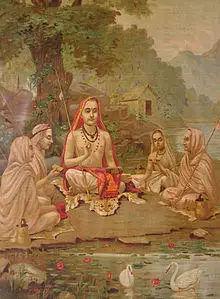Shankaracharya (शङ्कराचार्य) (IAST: Śaṅkarācārya, Shankara acharya) is a commonly used title of heads of monasteries called mathas in the Advaita Vedanta tradition of Hindu Dharma. The title derives from Adi Shankara, teachers from the successive line of teachers dating back to him are known as Shankaracharyas.[1][2]
Establishment of the tradition
Adi Shankara set up four monasteries known as Mathas or Peethams, in the North, South, East and West of India, to be held by realised men who would be known as Shankaracharyas. They would take on the role of teacher and could be consulted by anyone with of a spiritual nature.[3][4]
The table below gives an overview of the four Amnaya Mathas founded by Adi Shankara, and their details.[5]
| Shishya (lineage) | Direction | Maṭha | Mahāvākya | Veda | Sampradaya |
|---|---|---|---|---|---|
| Padmapāda | East | Puri Govardhanmaṭha Pīṭhaṃ | Prajñānam brahma (Consciousness is supreme being) | Rig Veda | Bhogavala |
| Sureśvara | South | Sringeri Śārada Pīṭhaṃ | Aham brahmāsmi (I am the supreme being) | Yajur Veda | Bhūrivala |
| Hastāmalakācārya | West | Dvāraka Kalika Pīṭhaṃ | Tattvamasi (That thou art) | Sama Veda | Kitavala |
| Toṭakācārya | North | Badari Jyotirmaṭha Pīṭhaṃ | Ayamātmānam brahma (This Atman is supreme being) | Atharva Veda | Nandavala |
Etymology
The word Shankaracharya, is composed of two parts, Shankara and Acharya. Acharya is a Sanskrit word meaning "teacher", so Shankaracharya means "teacher of the way of Shankara".[1]
Further reading
- Mukhyananda, Swami (2006) Sri Shankaracharya: life and philosophy: An elucidative and reconciliatory interpretation, 4th ed.; OCLC 426914596; Kolkata; Advaita Ashrama
- Esoteric Buddhism by A.P. Sinnett, pp 81 ISBN 1438503652
See also
- Adi Shankara
- Kalady, Kerala - the holy birthplace of Jagadguru Adi Shankaracharya
- Govardhan Peetham (East), Puri, Odisha
- Dwarka Sharada Peetham (West), Dwarka, Gujarat
- Jyotirmath Peetham (North), Jyotirmath, Badrikashram, Uttarakhand
- Shri Sringeri Sharada Peetham (South), Sringeri, Karnataka
- Shri Kanchi Kamakoti Peetham, Kancheepuram, Tamil Nadu
- Sri Jayendra Saraswathi, Shankaracharya of Kanchi
- Swami Abhinava Vidya Tīrtha, Shankaracharya of Sringeri
- Swami Bharati Tīrtha, Shankaracharya of Sringeri
- Swami Bharatikrishna Tīrtha, scholar; mathematician; first Sankaracharya to visit the West
- Swami Brahmananda Sarasvati, Srividya siddh Sankaracharya of Jyotirmaya Pitha, Shankara Matha, Badrinath
- Swami Shantanand Saraswati; Shankaracharya of Jyotirmaya Pitha
- Swami Swarupananda Sarasvati; Shankaracharya of Jyotirmaya Pitha, Sankara Matha, Badrinath
- Swami Candrasekhara Bharati, Shankaracharya of Sringeri
- Swami Saccidananda Bharati, Shankaracharya of Sringeri
- Swami Sacchidananda Bharati;Shankaracharya of Sringeri
- Swami Sacchidananda Shivabhinava Nṛusimha Bharati ; Shankaracharya of Sringeri
- Swami Vidyaranya Tīrtha, Shankaracharya of Sringeri
- Sri Sri Raghaveshwara Bharati, Jagadguru of Ramachandrapura Matha
References
- ^ a b Snow, Michael J. Mindful philosophy. Milton Keynes. ISBN 9781546292388. OCLC 1063750429.
- ^ Aditya Thakur (1 November 2014). "Just A Handful Of Hindus Know Adi Shankaracharya Revived Their Religion". Topyaps. Retrieved 16 May 2014.
- ^ Waite, Dennis, 1948- (2010). The book of one : the ancient wisdom of Advaita ([2nd ed.] ed.). Winchester, UK: O Books. ISBN 9781846943478. OCLC 573397586.
- ^ Barrett, David V. (2001). The new believers : a survey of sects, cults, and alternative religions. Barrett, David V. London: Cassell. ISBN 0304355925. OCLC 44933824.
- ^ "Adi Shankara's four Amnaya Peethams". Archived from the original on 26 June 2006. Retrieved 20 August 2006.
